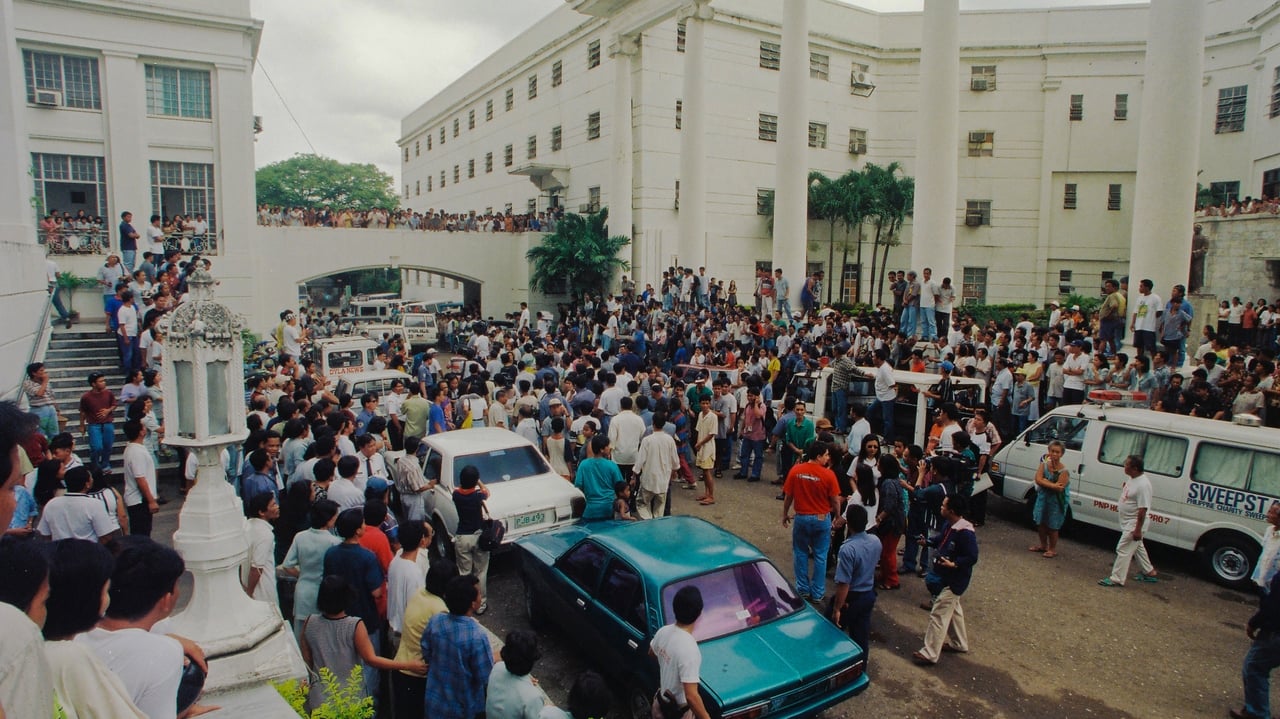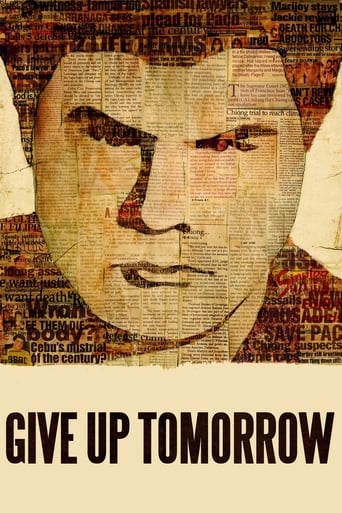

Yes the maker of this doc is a family member of one of the accused, and although 7 were convicted, this focuses on just the one family member, who does get special treatment because he's a member of a more wealthy family and a Spanish citizen. However, even after looking up the case i can't see any major evidence this doc left out, there was pretty much no evidence to convict him, and the corruption was so obvious it's crazy. This isn't a 'Jinx' or 'making a murder', where your left questioning if they done it or not, this is pretty obvious he did't do it, this is about showing how bad the country was at the time of the murder. There's just so much here thats crazy, paying people to testify, the judge saying there's 'to many' witnesses to him not being near the crime scene, promotions to law enforcement ppl who testified, immunity and 'gifts' to the testifying co-offender, the judge turning up dead after not sentencing them to death, not caring whose body was actually found (so they never actually found either body of the victims), the president being found guilty of corruption, the re-enactment that was broadcast..It's all crazy, the public demanded blood and the corrupt state done their best to supply it. A great documentary to watch in the knowledge that however corrupt and wrong you think things are, it's not as bad as this!
... View MoreClick "Yes" below if you are on the side of the rape victims and their family! It almost happened before. In September 1996, according to the Philippine Supreme Court decision G.R. Nos. 138874-75, the parents of a girl named Rochelle wrote a letter of complaint against teenager Paco Larranaga, stating that Rochelle was at the side of the road when Larranaga pulled up in a car full of teenage boys, and "grabbed Rochelle by her hand to try to get Rochelle to their vehicle. She resisted and got away from him. Sensing some people were watching what they were doing, they hurriedly sped away." Nevertheless, nothing was done because Larranaga was the son of a wealthy connected family, and the children of the rich usually get their way in the Philippines.A few months later, Larranaga and seven of his friends raped and killed two girls, by abducting them in a van they had rented for the occasion. In an extended trial in which both sides presented hours of testimony, and numerous appeals, the Philippine courts found Paco and his friends guilty of kidnapping, rape and murder.Although the Larranaga family lost in court, they are winners at the film festivals. Take away the exciting musical score and fast cutting, and the film boils down to this: the Philippines justice system is corrupt, and therefore Larranaga didn't rape anybody.I am a lawyer who has often stood up for the wrongly accused. Even before I checked out the evidence for myself, I suspected that he was guilty, just from watching the movie and tuning out the hype. I think what the film goers should remember is that two innocent women were raped and killed, and they are as vulnerable to the arbitrariness of the Phil justice system as Larranaga. Several witnesses placed Larranaga in the van with the other rapists, and I think that the rich kid's army of alibi witnesses don't count for much when you check their testimony. (By the way, I am not anti-rich. My family owns a lot of land in the Philippines.)Incredibly insulting was the conscious effort of the producers to portray Larranaga's family members as disinterested and victimized by the government, while vilifying the mother and father of the real victims to be liars who desperately want the wrong man to go to prison, based on what I thought was a nonsensical theory. The theory is that the Chiong family wants to frame Paco to prevent police from discovering that the daughters were killed by criminals who their father was doing business with. What the gullible international audience doesn't understand is that there is no reason for a person to deflect attention in a murder investigation, because in the Philippines, most murders go unsolved. And besides, the Larranagas are claiming that a father would rather continue to do business with criminals after they raped and killed BOTH of his daughters! I would say that this is insulting the public's intelligence, but based on the reviews, most of the public bought it. Perhaps it is just a prejudice that no one believes that the Philippine government could ever get anything right (I find it hard to believe too, but it is true in this case.) But the one place where this film was not well received was in Cebu, where the events took place. Filipinos know their system is corrupt, but they also know that their daughters are safer with the rapists in jail.This is a very good case study for the successful use of unethical pseudo-journalistic practices in documentary filmmaking. To top it off, one of the producers is part of Larranaga's wealthy clan, and I think it would have been fairer to disclose that at the beginning, not the end, of the movie.
... View MoreI saw this film two years ago as a secret screening at the True/False Film Festival. It was easily my favorite documentary that year, and one which will leave you disturbed long after the credits have rolled. The film outlines the arrest and conviction of Paco Larranaga and several other young men in the murder of two young girls. As the director peels the layers back on the story, more and more you see how the entire situation is a complete miscarriage of justice. This film will leave you feeling not unlike the Paradise Lost documentaries about the West Memphis Three. As someone who is poor and has little to no power, I implore anyone reading this to watch the film, get involved and help free a young man who had absolutely nothing to do with these crimes. I urge you to do your own research if you are skeptical, as some might think because the director is related to the convicted man. I watch documentaries with an avid passion, but few have left me so emotional as Give Up Tomorrow. A must see!
... View MoreBefore watching this movie, I was actually apprehensive. It was an unusual feeling for someone who watches movies frequently. "Give Up Tomorrow" is not a film of fiction, you see. It is a documentary about a notorious convicted rapist and murderer, involved in a locally sensational crime news story. This film, produced by someone in this person's extended family, will try to convince us that his relative, Paco Larranaga was actually an innocent man, and is now unjustly behind bars for the rest of his productive life.What I know of this case was what I gathered while skimming the newspapers or what I hear over the news. Paco's physical appearance, that of a hefty brusque arrogant young man, certainly did not help his image in the public. The case resurfaced recently when the Spanish government sought to intervene in the fate of this Spanish citizen. This perceived foreign interference in our justice system also did not sit very well with the Filipino people. The Larranaga family really had everything going against them.Of course, before going in, I had already expected this film to try to convince its viewers that all of what the general public knows from the news headlines was NOT the whole story. Important conflicting evidences were presented from the first few minutes.. As expected too, the uneven police investigation, the questionable star witness and the irregular court behavior of the presiding judge were also shown. They also showed how the Spain government got involved in the case. All of these important information had been previously unheard of, as far as I, an uninvolved outsider, was concerned.The most controversial points of this film were those that seemed to turn the tables on the parents of the victims themselves. Are Dionisio and Susan Chiong really the just the unfortunate, devastated parents of poor Jackie and Marijoy? This film seeks to shatter that commonly-held public perception. The film tells us about previously unknown connections to Malacanang and other shady dealings. How did the filmmakers get that ironic statement of Mrs. Chiong at the end on film? How the Chiongs were presented here was far from unbiased.This is certainly an eye-opening film. Everyone suspects that the justice system may be murky, but here was a story told from the inside by a family who seemed to have experienced the worse end of the stick. The argument as presented by the film is truly convincing. But again, we only hear from one side. The producer discloses in the film's publicity and at the end of the film that he is related to the Larranagas. Whether the audience believes what this film is trying to say is still up to them. People who like to think and discuss after watching films should watch this one.
... View More